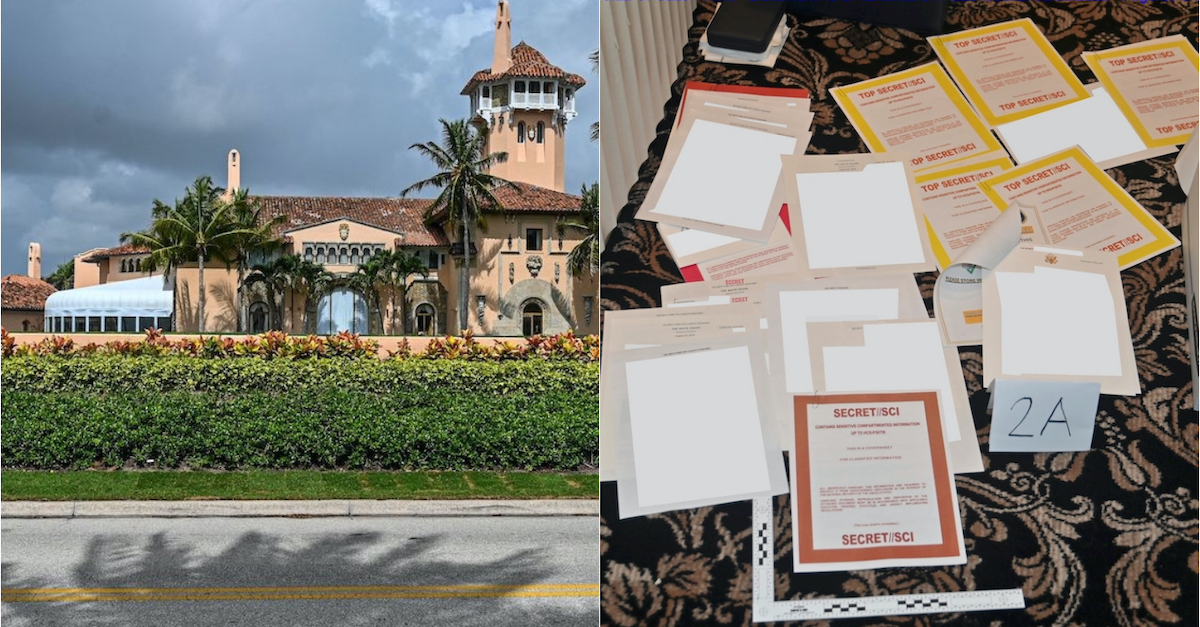
On the left, former President Donald Trump’s residence at Mar-A-Lago is pictured on Aug. 9, 2022. The photo on the right shows the highly classified documents that the FBI found inside Trump’s office. (Photo of Mar-a-Lago by Giorgio Viera/AFP via Getty Images; classified documents found in the search via DOJ)
The Department of Justice on Thursday signaled plans to appeal a federal judge’s ruling which granted former President Donald Trump’s request for a special master — and disrupted an investigation into the highly classified documents found inside Mar-a-Lago until that review concludes.
“Notice is hereby given that the United States of America, Defendant in the above-captioned matter, appeals to the United States Court of Appeals for the Eleventh Circuit from the order of the district court entered on September 5, 2022,” the single-sentence filing states.
As with previous filings, the notice of appeal bore the signatures of two top Justice Department officials: U.S. Attorney Juan Antonio Gonzalez and senior DOJ attorney Jay Bratt, the chief of the Counterintelligence and Export Control Section of National Security Division.
Shortly after submitting the notice, the Justice Department filed a motion for a stay signaling a broad attack on the ruling by U.S. District Judge Aileen Cannon, a Trump appointee.
Of the more than 11,000 government documents seized during the search of Mar-a-Lago, the motion for a stay focuses only on the more than 100 with classified markings.
For these, the government asks Cannon to lift two key findings of her order. The first is Cannon’s injunction blocking the government from using files seized from Mar-a-Lago for their investigation until a special master reviews the documents for attorney-client privilege and executive privilege. The second is the order forcing the government to turn over classified information to that special master for that purpose.
“Although the government respectfully disagrees with the Court’s injunction as to a much broader set of seized materials already in the possession of the investigative team, it is not at this time seeking a stay as to the vast majority of those materials,” the government’s motion states. “Instead, this motion is limited to the Order’s directives with respect to the seized classified records because those aspects of the Order will cause the most immediate and serious harms to the government and the public. The classified records—a discrete set of just over 100 documents—have already been segregated from the other seized records and are being maintained separately.”
Legal experts widely panned the order for temporarily putting up a roadblock during an active criminal investigation.
In separate interviews, three former federal prosecutors and a prominent national security lawyer told Law&Crime that there was no basis or need for a third-party to review whether Trump held any legitimate claim of privilege over more than 10,000 files that belonged to the government.
“This decision is far out of the mainstream decisions in criminal law cases,” former federal prosecutor Renato Mariotti previously told Law&Crime. Now a criminal defense attorney, Mariotti called the ruling a boon to lawyers like him who represent clients under investigation by the Justice Department.
They also noted that filing an appeal could be risky.
The 11th Circuit Court of Appeals is stacked with six Trump appointees, and the appellate battle could delay the investigation more than simply letting a special master perform and conclude his or her work.
Whatever of the composition of the appellate court, the DOJ appears to be sunny about its prospects — saying it’s “likely to succeed in its appeal.”
“[Trump] does not and could not assert that he owns or has any possessory interest in classified records; that he has any right to have those government records returned to him; or that he can advance any plausible claims of attorney-client privilege as to such records that would bar the government from reviewing or using them,” the motion states.
Judge Cannon had ordered the government and the former president to supply a list of special master candidates by Friday. The Justice Department says that it will supply that list as to the documents without classification markings on time.
During the Aug. 8 search of Trump’s Mar-a-Lago home, authorities found more than 11,000 government documents without classification markings. More than 100 were marked classified, up to top secret and above. The Washington Post reported that the documents included information about a foreign government’s nuclear capabilities. The search warrant listed suspected violations of three statutes: the Espionage Act, obstruction of justice and removal or destruction of records.
Cannon justified her ruling on the “undeniably unprecedented nature of the search of a former President’s residence” and the “importance of maintaining institutional trust.”
“The Court pauses briefly to emphasize the limits of this determination,” she wrote in her order. “Plaintiff ultimately may not be entitled to return of much of the seized property or to prevail on his anticipated claims of privilege. That inquiry remains for another day. For now, the circumstances surrounding the seizure in this case and the associated need for adequate procedural safeguards are sufficiently compelling to at least get Plaintiff past the courthouse doors.”
She rejected Trump’s claims, however, of a “compelling showing of callous disregard for [his] constitutional rights” by the federal government.
Read the notice of appeal, below: